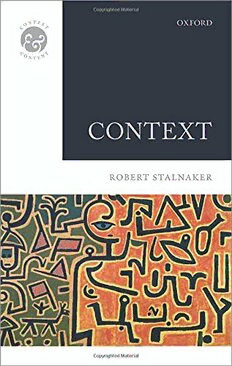
Context PDF
Preview Context
Context CONTEXTANDCONTENT Serieseditor:FrançoisRecanati,InstitutNicod Othertitlesintheseries: TheInessentialIndexical OnthePhilosophicalInsignificanceofPerspectiveandtheFirstPerson HermanCappelenandJoshDever TheMirroroftheWorld Subjects,Consciousness,andSelf-Consciousness ChristopherPeacocke AssessmentSensitivity RelativeTruthanditsApplications JohnMacFarlane Context Robert Stalnaker 1 3 GreatClarendonStreet,Oxford,OX26DP, UnitedKingdom OxfordUniversityPressisadepartmentoftheUniversityofOxford. ItfurtherstheUniversity’sobjectiveofexcellenceinresearch,scholarship, andeducationbypublishingworldwide.Oxfordisaregisteredtrademarkof OxfordUniversityPressintheUKandincertainothercountries #RobertC.Stalnaker2014 Themoralrightsoftheauthorhavebeenasserted FirstEditionpublishedin2014 Impression:1 Allrightsreserved.Nopartofthispublicationmaybereproduced,storedin aretrievalsystem,ortransmitted,inanyformorbyanymeans,withoutthe priorpermissioninwritingofOxfordUniversityPress,orasexpresslypermitted bylaw,bylicenceorundertermsagreedwiththeappropriatereprographics rightsorganization.Enquiriesconcerningreproductionoutsidethescopeofthe aboveshouldbesenttotheRightsDepartment,OxfordUniversityPress,atthe addressabove Youmustnotcirculatethisworkinanyotherform andyoumustimposethissameconditiononanyacquirer PublishedintheUnitedStatesofAmericabyOxfordUniversityPress 198MadisonAvenue,NewYork,NY10016,UnitedStatesofAmerica BritishLibraryCataloguinginPublicationData Dataavailable LibraryofCongressControlNumber:2013957454 ISBN 978–0–19–964516–9 Asprintedandboundby CPIGroup(UK)Ltd,Croydon,CR04YY LinkstothirdpartywebsitesareprovidedbyOxfordingoodfaithand forinformationonly.Oxforddisclaimsanyresponsibilityforthematerials containedinanythirdpartywebsitereferencedinthiswork. Contents Preface vii Introduction 1 1. ThreeNotionsofContext 13 2. CommonGroundandKeepingScore 35 3. PresuppositionRequirements 54 4. ContextandCompositionality 78 5. TheEssentialContextual 108 6. May,Might,If 126 7. DisagreementandProjection 161 8. ContextualismandtheNewRelativism 189 Appendix 208 References 237 Index 245 Preface This book had its roots in work begun more than forty years ago on presupposition and assertion, and I have been tinkering with the ideas Isketchedthen,offandon,eversince.Iamgratefulfortheopportunity provided byFrançoisRecanatito further developthese ideas in asetof lecturesinhisContentandContextseries.Ibenefitedfromstimulating discussion at those lectures from, among others, Herb Clark, Kathrin Glüer-Pagin, Peter Pagin, François Recanati, and Isadora Stojanovic. These four lectures, given in Paris in 2010, grew to six when I gavethe GaoslecturesthenextyearinMexicoCityattheInstitutodeInvestiga- cionesFilóficasattheUniversidadNacionalAutónomadeMexico.Iam gratefultothephilosophersoflanguageattheUNAMfortheinvitation togivetheselectures,andforthestimulatingdiscussionsthatIhadwith themduringmymonththere.ThanksalsotothephilosophersatBrown Universitywhereearlierversionsofthreeofthechaptersconstitutedthe JosiahRoycelectures,giventherein2007. The 1970s, when I first started thinking about pragmatics, were exciting times in the philosophy of language, with a lot of fruitful interactionbetweenphilosophersandlinguists,whowerejustinventing theoreticalsemanticsandpragmaticsasitispracticedtoday.Amongthe linguists who helped to draw me into the subject at that time and to appreciate the relevance of their work to philosophical issues were Lauri Karttunen, George Lakoff, Barbara Partee, Stan Peters, and Sally McConnell-Ginet. Philosophers and linguists tended to go their separate ways in the decade after the 1970s, but from the early 90s to the present, interdis- ciplinary work in semantics/pragmatics, and philosophical uses of lin- guistic results have again flourished. Interdisciplinary work is more demanding than it was in the 70s, since a lot of sophisticated theory has been developed since then, and alternativeframeworks haveprolif- erated.ButIhavehadalotofhelpfromtheworkofmanylinguists,and from discussion with them, including Angelika Kratzer, Paul Portner, Craige Roberts, Philippe Schlenker, Mandy Simons, and my MIT col- leagues,KaivonFintel,DannyFox,IreneHeim,andSabineIatridou. viii PREFACE Among philosophers, my debts to Paul Grice, David Kaplan, David Lewis,JohnPerry,andMarkRichardwillbeevidentfromthediscussion inthebookoftheirworkandideas. IandmycolleaguesinphilosophyatMIThavebeenfortunatetohave a really excellent group of graduate students over the past few decades, many of whom have made and are making important contributions to the fast moving interdisciplinary field of pragmatics. Their work, and discussion with them while they were students and since, have had a profound, and I hope positive, influence on the ideas that I develop in this book. This group, going back more than twenty years, includes Lenny Clapp, Andy Egan, Sarah Moss, Dilip Ninan, Alejandro Pérez Carballo, Agustín Rayo, Paolo Santorio, Jason Stanley, Eric Swanson, ZoltanGendlerSzabó,andSethYalcin. CraigeRobertsreadacompletedraftofthemanuscript,andgaveme extremely helpful comments that led to major revision and reorganiza- tion.Theideas developed inChapters6and7werestronglyinfluenced by Seth Yalcin’s work on epistemic modals, and extensive correspond- ence and discussion with him about these issues led to significant corrections and (I hope) improvements. Thanks to both Craige and Sethfortheirhelp. A version of Chapter5 was previously published as Stalnaker 2011a. ThankstoOxfordUniversityPressforpermissiontoincludepartsofthat paperinthisbook. Thanks to my editor, Peter Momtchiloff for advice, support, and patience. Thanks also to Jan Chamier for meticulous copy editing, and to Jack Marley-Payne for editorial help at the last stage of the process, includingcompilingtheindex. Introduction Thisbookisanexplorationofthecontextsinwhichspeechtakesplace, of the ways we represent them, and of the roles they play in explaining theinterpretationanddynamicsofspeech.Inthisintroductoryoverview, myaimistoprovideasketchofthegenerallineofargumentofthebook, thenarrative,astheysay.OrperhapsIshouldsaythatmyaimistoset theargumentofthebookincontext. The central thesis thatguides theexploration isthat it ispossible and fruitfultotheorizeaboutthestructureandfunctionofdiscourseindepend- entlyofspecifictheoryaboutthemechanismsthatlanguagesusetoserve thosefunctions.This roughstatement ofthethesis(whichIwilldubthe autonomyofpragmatics)needstoberefinedandqualified,whichIwilltry todointhecourseofthebook.Iwilldefendthethesismainlybydeveloping somepragmatictheorythatIhopewillillustrateit,andbyapplyingthat theorytotheexplanationofarangeofspecificlinguisticphenomena.The thesisneedsqualificationsincethedatatobeexplainedbysuchatheoryare always data concerning the uses of particular expressions of particular languages, and interpreting the data requires making some assumptions aboutthesemanticsoftheexpressionsinvolved,butthehopeisthatone cansometimesdefendandapplypurelypragmaticprincipleswhilemaking only relatively uncontroversial assumptions about the semantics. Even though the focus will be on pragmatic explanation, the interaction of contextwithsemanticinterpretationwillbeacentralconcernofthebook. The thesis of the autonomy of pragmatics is inspired by the work of PaulGricewhoseprofoundinfluenceonmythinkingaboutalltheissues Iwilldiscuss willbeclear.Gricewroteatatimewhensemantictheory, asappliedtonaturallanguage,wasatamuchmoreprimitivelevelthanit is today, so the issues about the relation between semantics and prag- maticsatthattimeweresimpler,butIthinkthegeneralGriceanstrategy
